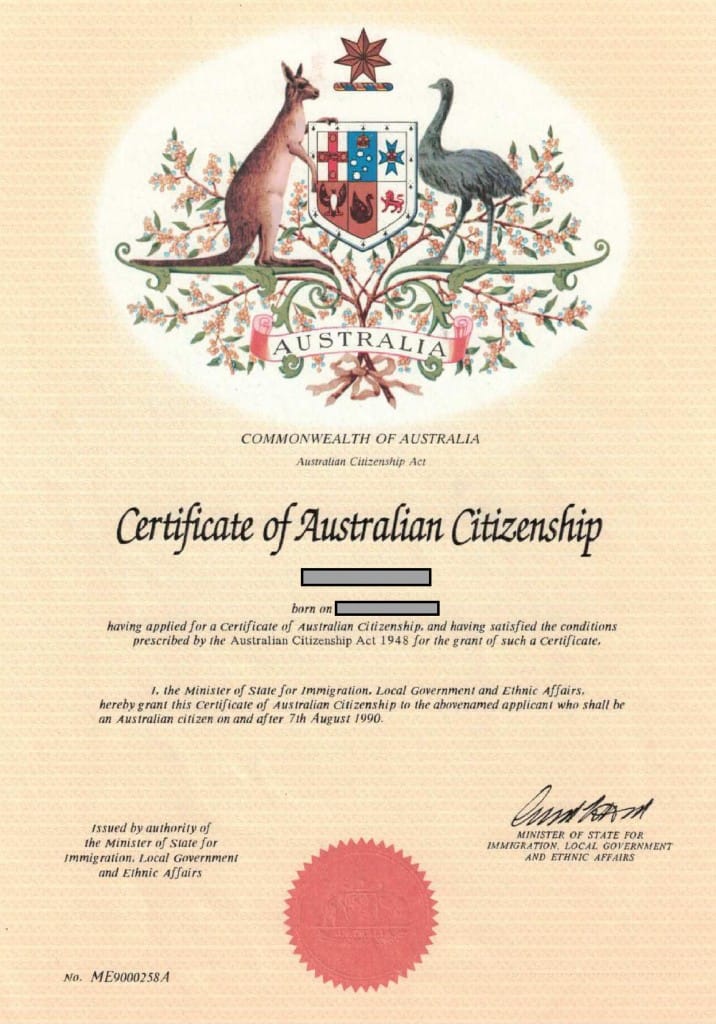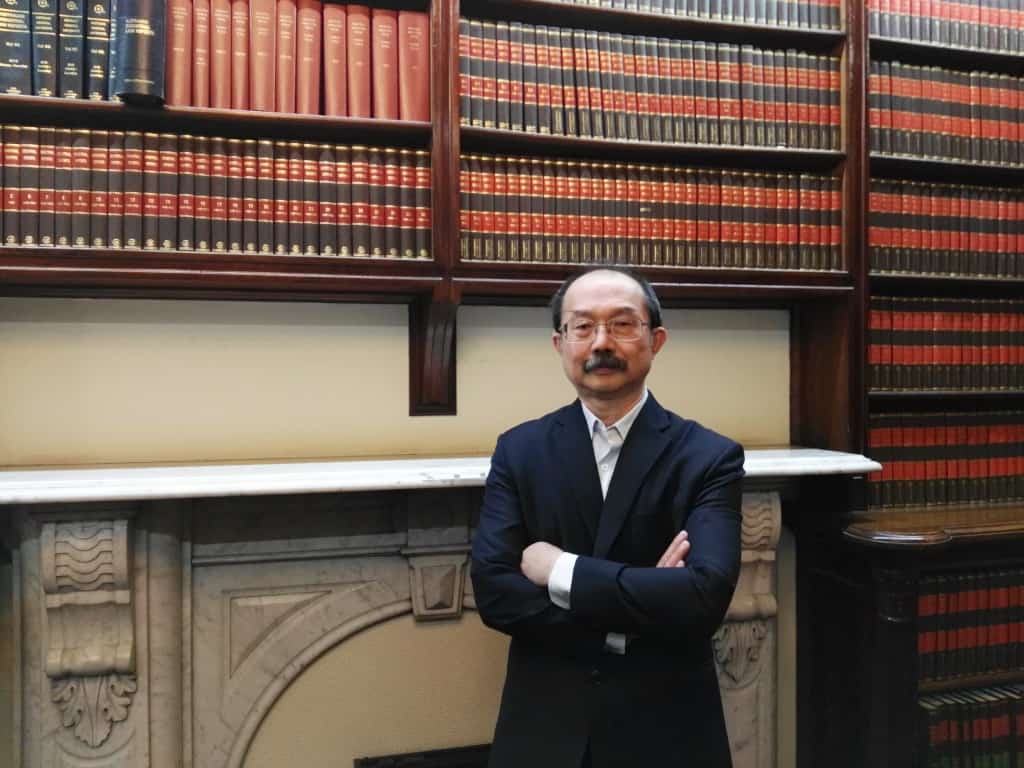
Giving up Australian citizenship or cessation of Australian citizenship – there are 7 ways you can lose your Australian citizenship.
Australian citizenship is governed by the Australian Citizenship Act 2007.
You may cease to be an Australian citizen by:
- Renouncing under s 33
- Engaging in certain terrorist or other related conduct under s 33AA (renunciation by conduct)
- The Minister revoking under s 34 (for offences or fraud) and s 34A (special residence requirements)
- By fighting for, or being in the service of, a declared terrorist organisation overseas under s 35 (service outside Australia in armed forced of an enemy country or declared terrorist organisation) or s 35AA (declared terrorist organisation)
- By serving in the forces of a country at war with Australia under s 35
- By being convicted for terrorism offences and certain other offences under s 35A
- Being a child of responsible parents who cease to be citizens under s 36 (this is discretionary in line with Australia’s international obligations to the Universal Declaration of Human Rights and the Convention on the Rights of the Child in relation to arbitrary deprivation).
Before losing or giving up Australian citizenship, the government must ensure that you are also a citizen of another country (this is to ensure you do not become a stateless person) and you have acted inconsistently with your allegiance to Australia (Australian Citizenship Amendment (Allegiance to Australia) Act 2015). Your conduct must be incompatible with the shared values of the Australian community and your conduct must demonstrates that you have severed the common bond of Australian citizenship and you repudiated your allegiance to Australia.
If you are in Australia when losing or giving up Australian citizenship, you will automatically (by operation of s 35 of the Migration Act 1958) hold an ex-citizen visa. This is a permanent visa giving you permission to remain in Australia but does not allow you to travel outside of Australia.
If you are outside of Australia when losing or giving up Australian citizenship, you do not hold a visa unless you applied and granted one.
Renunciation by application: s 33
You can apply, in accordance with s 46, to renounce your or giving up Australian citizenship under s 33(1). The Minister must approve or refuse your application (s 33(2)).
You must be over 18 and is a national or citizen of another country (s 33(3)) or you will become a national or citizen of another country (s 33(7)) for the Minister to approve your application.
The Minister must not approve your application if he is not satisfied of your identity (s 33(4)).
The Minister may refuse your application if you are a national or citizen of another country and is engage in a war with Australia (s 33(5)).
Similarly, the Minister must not approve your application if it is not in the interests of Australia to do so (s 33(6)).
Once the Minister approved your renunciation application, you will cease to be an Australian at the time of the approval (s 33(8)).
Some people renounce their Australian citizenship not to retain or acquire another citizenship, or to avoid significant hardship or detriment. Under policy, if you renounced your citizenship for other reasons, you may not be eligible to resume your Australian citizenship. However, you may be eligible for citizenship by conferral or by descent, or by adoption (s 19C).
Once a decision has been made, you will be notified (s 47).
Renunciation by conduct: s 33AA
Another way for losing or giving up Australian citizen is by your conduct (s 33AA). You must be over 14 and is also a citizen of another country if you acted inconsistently with your allegiance to Australia by engaging in specified conduct.
You are taken to have renounced your Australian citizenship if you engaged in the following specified conduct:
- Engaging in international terrorist activities using explosive or lethal devices
- Engaging in a terrorist act
- Providing or receiving training connected with preparation for, engagement in, or assistance in a terrorist act
- Directing the activities of a terrorist organisation
- Recruiting for a terrorist organisation
- Financing terrorism
- Financing a terrorist and
- Engaging in foreign incursions and recruitment.
The above conduct can be engaged offshore or onshore but left Australia before being charged and brought to trial (s 33AA(7)).
For s 33AA to apply, your conduct is engaged in with the intention of advancing a political or ideological cause and with the intention of coercing or influencing an arm of the Australian Government or a government of a foreign country or intimidating the public. This is a question of fact.
If s 33AA applies, the losing of Australian citizenship come into effect immediately upon you engaging in the terrorist-related conducted (s 33AA(9)).
If the Minister becomes aware that you have renounced your Australian citizenship under s 33AA, he must give, or make reasonable attempts to give, written notice as soon as practicable (s 33AA(10)).
The Minister also have the power to rescind a notice or determination that you ceased becoming an Australian citizen by your conduct (s 33AA(14)).
Losing Australian citizenship for service in enemy country or a declared terrorist organisation: s 35
If you are 14 or older, you may lose your Australian citizenship if you are also a citizen of another country and serves in the armed forces of a country at war with Australia or fight for, or is in the service of, a declared terrorist organisation under s 35AA and your service or fighting occurs outside Australia (s 35). However, the Minister may exempt you from effect of s 35 in relation to certain matters (s 35(9)).
Your Australian citizenship will cease at the time you commenced to service or fight for an enemy country or a declared terrorist organisation (s 35(2)).
You will not be in the service of a declared terrorist organisation if (s 35(4):
- Your action is unintentional
- You acted under duress or force of
- You provided neutral or independent humanitarian advice
If the Minister intend to revoke your Australian citizenship, he must, unless exempted, give, or make reasonable attempts to give, written notice as soon as practicable and your rights to review (s 35(6)).
The Minister has the discretionary power under s 35(9) to make a determination rescinding the notice of cessation under s 35(5) and exempt you from the operation of s 35. However, the Minister does not have a duty, and is not obliged, to consider whether to exercise this power (s 35(10)).
The Minister’s s 35(9) decision can be reviewed.
Losing Australian citizenship if convicted for terrorism and related offences: s 35A
You may lose your Australian citizenship if:
- You have been convicted of a specified terrorist-related offence (s 35A(1))
- You have been imprisoned for at least 6 years
- You are a dual citizen
- Your conduct demonstrates that you have repudiated your allegiance to Australia
- The Minister is satisfied that it is not in the public interest for you to remain an Australian citizen
You do not automatically lose your Australian citizenship the Minister has to make a determination (s 35A(1)).
If a determination is made, you will be notified (s 35A(5)) unless exempted, you ceased to be an Australian citizen at the time when the determination is made (s 35A(2)).
If your conviction is overturned on appeal or quashed and no further appeal can be made to a court, the Minister must revoke the determination to revoke your Australian citizenship (s 35A(8), (9)). In the alternative, you may request the Minister under s 35A(1) to revoke.
Losing Australian citizenship for offences or fraud: s 34
The power to revoke Australian citizenship for offences or fraud under s 34 can only be made by the Minister because this power cannot be delegated.
You be convicted of an offence under s 50, or under the Criminal Code or you become an Australian citizen as a result of a third-party fraud (see s 34(8)) and the Minister is satisfied that it would be contrary to the public interest for you to remain an Australian citizen (s 34(1); s 34(2)) and you are able to become a national or citizen of another country.
If you have been convicted of a serious offence against an Australian law or a foreign law and you have been sentenced to death or to a serious prison sentence of at least 12 months before you became an Australian citizen, your citizenship may also be cancelled under s 34(5).
If you obtained Australian citizenship as a result of migration-related fraud, your citizenship may also be cancelled (s 34(6)) unless the act or omission that constituted that offence was not in any way material to you becoming a PR (s 34(7)). Similarly, if there was a third-party fraud (s 34(8)).
Child losing Australian citizenship due to parents ceasing to be citizens: s 36
A child’s Australian citizenship may be revoked under s 36 if the child has a responsible parent who ceases to be an Australian citizen by renunciation under s 33 or revocation under s 34.
However, the child’s citizenship cannot be revoked while the child has another responsible parent who is an Australian citizen or if the revocation will cause the child to become stateless.
Australian migration law is complex and difficult to understand, contact our immigration lawyer for a consultation (fee applies) to help you understand the implication of giving up Australian citizenship. Click here to learn how you may request for evidence that you are an Australian citizen.

 041 222 4020 or WeChat: AUDvisa
041 222 4020 or WeChat: AUDvisa
This article is not intended to be or taken as migration legal advice. The author of this article disclaims any liability for any action or omission on the information provided or not provided in this article. You should always consult an immigration lawyer or a registered migration agent to form an informed opinion on your immigration matter.



